Text
Hey did you know I keep a google drive folder with linguistics and language books that I try to update regularly
220K notes
·
View notes
Text
大草原不可避 : Keyboard smashing in Japanese
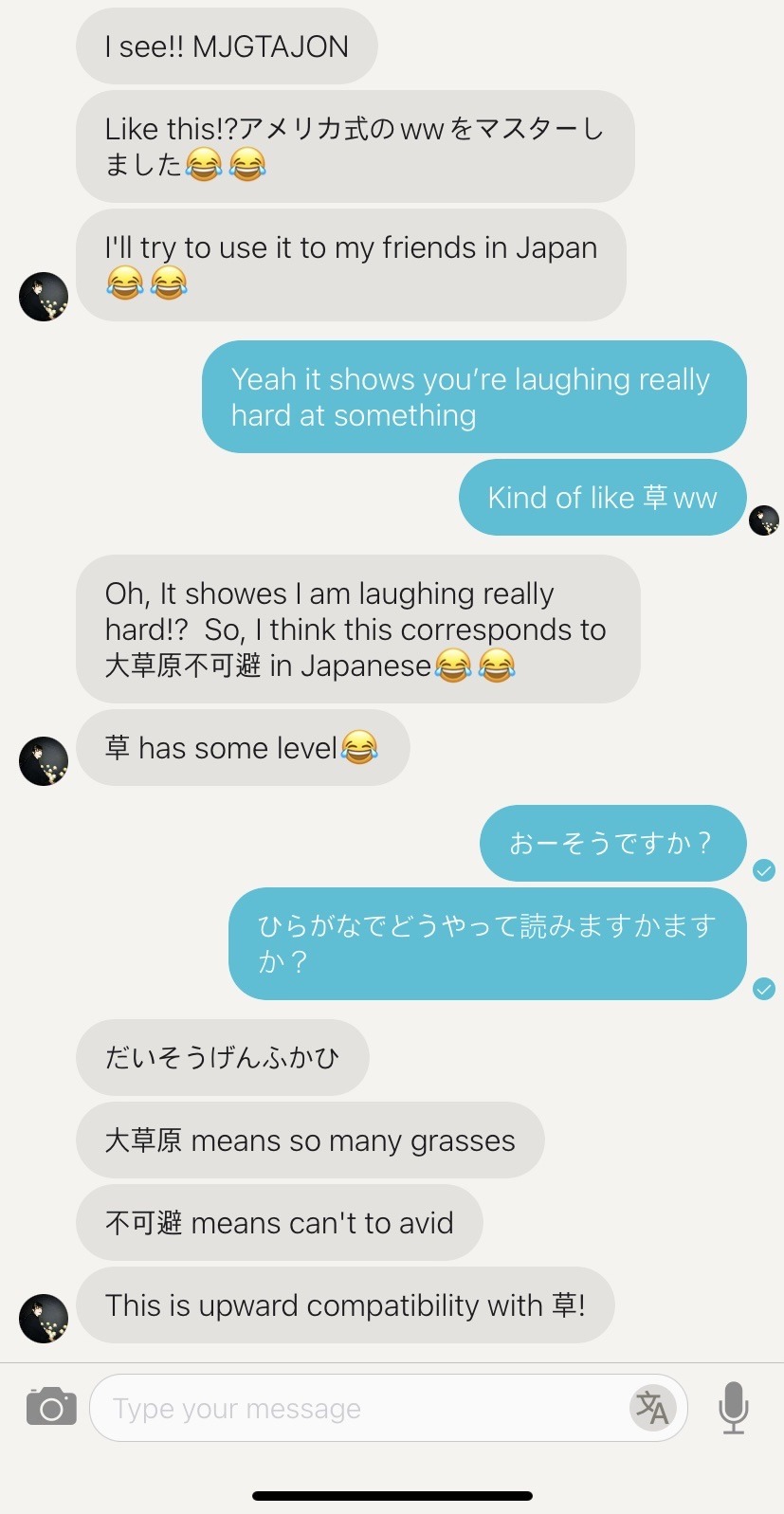
I explained how keyboard smashing in English expresses laughing really hard and she taught me the Japanese equivalent in return!!
As some of you might know, in Japanese, “w” from the word “to laugh” 笑う 「わらう」 is basically like “lol” in Japanese so when there’s a bunch of “w”’s together it looks like this wwwwwwwwwwwwwwwwwwwwww
and it looks like a bunch of grass so one slang word to show something is funny is 草 「くさ」 which is the word/kanji for grass so you don’t have to type out a bunch of w’s.
So the step up from 草 is 大草原 「だいそうげん」 which means prairie since there’s a lot more grass.
And if something leaves you laughing so much that you can’t hold it back you could say 大草原不可避 「だいそうげんふかひ」 which basically means “inevitable prairie”.
The “inevitable part”, 不可避 「ふかひ」 in this phrase means laughter is inevitable and you can’t help but laugh.
39K notes
·
View notes
Text
BIN AM VERZWEIFELN
Wessen verdammte idee war es die vwa einzuführen??? Ich würde lieber zwei weitere maturen machen als EINE EINZIGE VWA ZU SCHREIBEN.
Mental bin ich so am boden... ich bin wirklich kurz davor alles hinzuschmeißen. Auch wenn der weg lange gedauert hat und schmerzhaft war. Ich packe es einfach nicht mehr..... scheiss auf die matura..... scheiss auf alle politiker die meinen sie wüssten alles besser und ändern das Schulsystem ständig so dass es schwieriger wird diese abzuschließen. Ich hasse euch und verfluche euch.
Die schule ist generell ein schrecklicher ort für personen mit mentalen Störungen wie Depressionen oder Angstzuständen und da überlegen die sich dass ganze noch unerträglicher zu gestalten. Ich verfluche euch alte säcke. Ihr habt es einfach gehabt und jetzt vollt ihr hier gatekeeper spielen damit weniger leute es schaffen. Fickt euch mit eurem elitist bullshit.
#österreich#austria#matura#school system#schulsystem#abitur#gymnasium#schule#lernen#vorwissenschaftliche arbeit#matura vwa#austrian shit post#austrian meme#rant#studyblr#german studyblr#langblr#german
6 notes
·
View notes
Photo


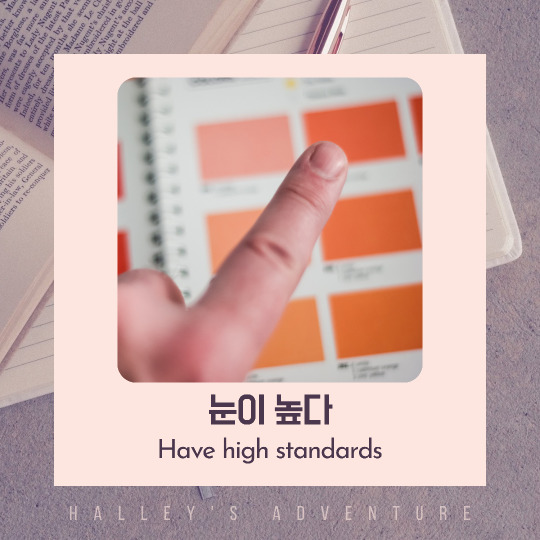

[KOREAN VOCABULARY] Commonly used expressions
Let’s start the week light with some commonly used expressions in Korean. If this is the first time you’ve seen these expressions then don’t forget to write them down together with the examples for future revision.
1. 고민이 많다: have a lot on one’s mind - 그는 요즘 일과 아이들 문제로 고민이 많다. He has many worries about his job and his children these days.
2. 두말하면 잔소리: It goes without saying that… - 환경보호가 중요함은 두말하면 잔소리다. It goes without saying that the protection of the environment is important.
3. 눈이 높다: have high standards/expectations, aim high - 그는 눈이 높아서 웬만한 여자는 성에 차지 않는다. His standard for women is so high that he cannot be satisfied with any normal girl.
4. 고비가 왔다: a crucial moment has come - 그녀의 커리어에 고비가 왔고, 그녀는 이직을 할지 결정해야만 한다. A crucial moment has come in her career, and she must decide whether to move companies.
____________________
Don’t forget to LIKE and SHARE this post with your friends and let’s keep on studying 😘
____________________
☎️ CONTACTS ► Personal Instagram – halleyj96119 ► Study Instagram – studywith.halley ► Tumblr – halleyj96 ► Youtube – Halley’s Adventure ► Facebook – Halley’s Adventure ► WordPress – Halley’s Adventure ► Email – [email protected]
142 notes
·
View notes
Text
Hey did you know I keep a google drive folder with linguistics and language books that I try to update regularly
UPDATE because apparently not everyone has seen this yet the new and improved version of this is a MEGA folder
I know there’s so many more urgent things but if you like this resource you may consider buying me a ko-fi
220K notes
·
View notes
Text
For all of my Japanese-learning followers out there, I thought I’d recommend this website:
https://marshallyin.com/course/
It’s a really in-depth course right from beginners up to intermediate level, completely free (though some features you only get if you have an account), complete with games, tests, downloads, forums, leaderboards etc.
My friend pointed it out to me, and I’ll definitely use it when I start learning Japanese next year! Check it out!
463 notes
·
View notes
Text
How to read kanji?

The answer is that all of them are correct when you treat reading kanji as something impossible.
Today, I’ll present you with a few kanji reading “rules”. However, treat them as your last resort. Kanji work in unpredictable ways:
Verbs are usually read with kun’yomi: easier said than done, it’s not a rarity that one kanji appears in more than one verb. A Japanese verb usually comes in two variations: intransitive (it means that something is happening on its own) and transitive (it means that someone is doing something). These intrasitive-transitive verb pair can be read with the same kun’yomi reading (壊れる・こわれる・kowareru “to be broken” vs 壊す・こわす・kowasu “to break”) but sometimes not (消える・きえる・kieru “to disappear” vs 消す・けす・kesu “to make sth disappear” or “to erase”). There are also instances of a one kanji which appear in two (ore more) verbs with different meanings and kun’yomi readings (行く・いく・iku “to go” vs 行う・おこなう・okonau “to perform”). However, that doesn’t change the fact that verbs are usually read with kun’yomi. The exception to this rule is verbs ending in ~じる・~jiru. Kanji attached to this hiragana stem are read with on’yomi (感じる・かんじる・kanjiru “to feel”)
Nouns consisting of a single kanji are usually read with kun’yomi: there are a few instances of kanji with on’yomi reading only and in such cases… well, you have no choice but to read it with on’yomi, for example: 意・い・i “meaning” or 胃・い・i “stomach”, and well… there are a few f*&kers which have both kun’yomi and on’yomi, yet when standing on its own as a noun we read them with on’yomi, for example 茶・ちゃ・cha “tea”
Nouns/adjectives composed of two kanji, which DON’T have any hiragana stem attached to it are OFTEN read with on’yomi: that’s probably the least helpful rule since there HUNDREDS of exceptions: 1) two kanji compound read with kun’yomi 暗闇・くらやみ・kurayami “darkness”, 2) two kanji compound read with mixed readings 両手・りょうて・ryoute “both hands” (りょう is on’yomi while て is kun’yomi) 3) exceptional readings: 雪崩・なだれ・nadare “avalanche” (both of these kanji are normally NOT READ like this)
Nouns/adjectives composed of two kanji, which HAVE a hiragana stem attached to it are USUALLY read with kun’yomi: look at this example: 殺人 vs. 人殺し, the first one is read with on’yomi さつじん・satsujin “murder” and the second one with kun’yomi ひとごろし・hitogoroshi “murderer”, I suspect there are exceptions to this rule but I can’t think of anything right know
More than three kanji without a hiragana stem is usually read with on’yomi
To conclude this optimistic post, I’ll give you my personal advice. Kanji can be compared to printers: when they feel your fear and impatience towards them, they refuse to cooperate. Clear your mind, get rid of your desperation, look at the kanji and read it.
Don’t TRY to read kanji. Just read them.

That’s a logical complaint. I’ll try to answer it in another post.
1K notes
·
View notes
Text
casual french phrases 🐶
♡ Ça roule? -Comme d’hab!
means “everything’s great and life’s going well.” In the form of a question, it simply means “How’s life? Good?” Otherwise, the more standard question used to express this same idea is Ça va? “Comme d’hab” can be used in place of “comme d’habitude” (as usual) in any informal setting.
♡ N’importe quoi!
means “whatever,” and is commonly used in French when someone is exasperated and wishes to openly display their disagreement in a simple, informal way. It can also mean “anything” like in this example: J’aurais donné tout et n’importe quoi ! (I would have given anything and everything!)
♡ C’est n’importe quoi!
This phrase means “That’s nonsense!”
♡ Laisse tomber…
means “just forget it,” or “never mind that.” It literally means “drop it,” but doesn’t have quite the same snappy tone behind it as “just drop it!” does in English.
♡ Ça te dit?/Ça vous dit?
“You up for it?,” this casual French expression is great for suggesting outings with friends or restaurant choices. It can also mean “Sound good?”
♡ Tiens-moi au courant!
“Keep me up to date!” This is the perfect French phrase to use as you’re waiting to see how things play out in a friend’s life.
♡ Allez savoir pourquoi !/Va savoir pourquoi !
“for whatever reason”/”God knows why”/ “your guess is as good as mine!” This is a useful phrase that perfectly expresses one’s befuddled state of mind.
♡ Bref.
“in brief”. Other synonyms would be “all in all” or “in short.”
♡ T’sais?
means “Ya know?” and is oftentimes tacked onto the end of a sentence to emphasize whatever the speaker is saying.
♡ Ouais, enfin…
“Yeah, well…” For example: Ouais, enfin…faut vivre avec! (Yeah, well…gotta live with it!)
♡ Allez !
“Oh C’mon!” This interjection is the best way to communicate impatience with someone. It also means “Let’s go!” (Note that it is common to hear this word in the bleachers of a sports event: C’mon! Let’s go! Allez, allez !)
♡ C’est naze/c’est nul/c’est pourri !
means “that sucks!” or “that’s stupid!” or “that’s terrible!” The general implication is that whatever is being discussed is either a total bore or totally ridiculous.
♡ J’ai le cafard…
means “I’m feeling a little down” or “I’m feeling blue,” this is an informal way of expressing your sadness. It literally means, “I have the cockroach,” but to use the verb phrase avoir le cafard simply means to be depressed or to feel do
♡ Ça te changera les idées…
“It’ll take your mind off things…” Use this French phrase when consoling a friend who’s down.
♡ Revenons à nos moutons !
used after the conversation has strayed from the original topic, and literally means “let’s get back to our sheep!” It actually means “Let’s get back to the point!”
♡ Je n’en crois pas mes yeux !
“I can’t believe my eyes!” This is a perfect informal French phrase to let loose when you’re pleasantly surprised or dumbfounded by something you are witnessing.
♡ Tu t’en sors ?
used while observing a friend who appears to be having difficulty doing something. It’s the equivalent of asking “Doing okay there? You managing there?”
♡ J’en mettrais ma main au feu !
“I’d bet my life on it!”, literally means “I’d put my hand in the fire!” It simply means that you are certain of something, and is usually used as a statement to try and convince others that you are right about something.
♡ Il ne faut pas mettre tout dans le même sac !
“You can’t just group it all into the same category!” This is your go-to casual French expression for when one of your friends is generalizing, and it literally means, “you can’t put everything in the same bag!”
♡ Tu fais quoi ?
The phrase “What’s up?” would be the best way to portray the laid-back style of this French phrase. It is highly informal, and not recommended that you use it with anyone other than family or close friends.
7K notes
·
View notes
Text
Korean slang to spice up your convos

안녕하세요 여러분! 오랜만이에요!! Hello everyone! It's been a while. I've been experimenting with different methods on learning Korean recently and one of the things that have helped me the most is having conversations with natives on HelloTalk and Instagram. I highly recommend meeting people around your age to start a conversation. You can pick up a bunch of cool slangs (줄임말 - abbreviated words and 속어 - slang) ! Here's just a few for you guys to use and enjoy! Note: There is some profanity ^^;
ʙʏ ᴀɴ ᴀᴠɪᴅ ꜱʟᴀɴɢ ᴜꜱᴇʀ *𝘕𝘖𝘛𝘌: 𝘐 𝘢𝘮 𝘯𝘰𝘵 𝘢 𝘯𝘢𝘵𝘪𝘷𝘦 𝘴𝘱𝘦𝘢𝘬𝘦𝘳. 𝘐𝘧 𝘐 𝘮𝘢𝘬𝘦 𝘢𝘯𝘺 𝘮𝘪𝘴𝘵𝘢𝘬𝘦𝘴, 𝘧𝘦𝘦𝘭 𝘧𝘳𝘦𝘦 𝘵𝘰 𝘤𝘰𝘳𝘳𝘦𝘤𝘵 𝘮𝘦 𝘪𝘯 𝘵𝘩𝘦 𝘤𝘰𝘮𝘮𝘦𝘯𝘵𝘴 𝘴𝘦𝘤𝘵𝘪𝘰𝘯.* "___" → 𝘓𝘪𝘵𝘦𝘳𝘢𝘭 𝘮𝘦𝘢𝘯𝘪𝘯𝘨 𝘼𝙗𝙗𝙧𝙚𝙫𝙞𝙖𝙩𝙞𝙤𝙣𝙨 ㄱㄴ → 가능 possible, sure ㅁㅎ → 뭐해? what are you doing? ㄴㄱ → 누구, 누가 who ㄱㄷ → 기다려 wait ㅂㄷ → 부들 shaking with anger 𝙍𝙖𝙣𝙙𝙤𝙢𝙨 갠춘→ 괜찮아 it's okay 어케,어캐 → 어떻게 how 글쿠나, 글쿤 → 그렇구나 ah, I see 솩 → 수학 math 셤 → 시험 test, exam 긍까 → 그렇니까 yeah, mhm, yup 핫플 → 핫프레이스 → 유명한 곳 a popular place 모솔/모쏠 → 모태솔로 single since birth 젤 → 제일 the most 체고 → 최고 the best 몰폰 → 몰래 폰하기 secretly using the phone (probably playing games, messaging etc. during class) 존잘 → 존나 잘생겼다 Fucking handsome 뒤질래? → 죽을래? Do you wanna die? 쩐다 → awesome, fantastic 레겐드, 레게노 → 레전드 "legend", the best, phenomenal 베프 → 베스트 프렌드 best friend 실친 → 실제 친구 줄임말 a true friend 쨈, 째다 → 보통 학생들이 ‘학교를 째다, 수업을 째다’ 라은 표현으로 사용합니다. Play hooky, skip (class, school) 통했어 → "to flow", share the same brain, on the same page 갠소 → 개인소개로 1대1 미팅 소개해준다는걸 말해요. One-on-one introduction 관종 → 관심 종자 attention seeker 𝙄𝙣𝙩𝙚𝙧𝙣𝙚𝙩-𝙍𝙚𝙡𝙖𝙩𝙚𝙙 𝙎𝙡𝙖𝙣𝙜𝙨 갭쳐본,캡본 → 사진 캡쳐한 거 screenshot 자소 → 자기 소개 self-introduction 배본, 배사본인 → 배경사진 본인 background photo 짤 → memes 디코 → 디스코드 Discord 헬톡 → 헬로우톡 HelloTalk 렉 걸리다 → to lag, lagging 팔취 → 팔로우 취소 unfollow 카톡 → 카카오톡, 카카오톡으로 한국에서 국민들이 사용하는 메신저입니다. Kakaotalk 움짤→ 몇초간 움직이는 영상, gif 뽀샵, 포샵 → 포토샵의 줄임말. Photoshop 𝙍𝙚𝙢𝙚𝙢𝙗𝙚𝙧 𝙩𝙤 𝙤𝙣𝙡𝙮 𝙪𝙨𝙚 𝙩𝙝𝙚𝙨𝙚 𝙨𝙡𝙖𝙣𝙜𝙨 𝙬𝙞𝙩𝙝 𝙥𝙚𝙤𝙥𝙡𝙚 𝙮𝙤𝙪'𝙧𝙚 𝙘𝙡𝙤𝙨𝙚 𝙬𝙞𝙩𝙝~~
--
Thanks for reading! Until next time! 다음에봐요!!
If you’re new, I’m Alli and I make my own infographics and lessons to help you learn Korean with ease! If you’re interested in more of these types of lessons, visit my blog here! 💕
110 notes
·
View notes
Text
He was always the life of the party. 걔는 언제나 파티 분위기를 띄우는 사람이었지.
Have her take a look at it. She's pretty tech-savvy. 걔한테 좀 맡겨봐. 걔는 최신기술에 꽤 정통하거든.
Lennon's untimely death shocked the entire world. 레논의 때아닌 죽음은 전 세계를 충격에 빠뜨렸다.
She met an untimely death at the age of 20. 20세에 때 이른 죽음을 맞았습니다.
No way. That'd make a huge dent in our budget. 안 돼. 그럼 우리 예산에 큰 구멍이 날 거야.
He clearly started the project without much forethought. 분명히 사전 숙고를 많이 하지 않고 그 프로젝트를 시작한 거예요.
62 notes
·
View notes
Text
getting to know your characters.
often times, when we create our characters, we see them as just that: characters. now, if you’re like me, and you like to add depth to your characters without them turning into little copies of yourself, you came to the right place ! in this post, i will be listing ways to help you better understand and develop your characters.
1. using oc templates !
i know, i know. finding templates and trying to fill out a ten page template can be very, very draining. but it’s worth it ! it helps you get a better understanding of who your character is. i often find my templates on deviantart !
2. create a voice journal !
this has to be one of the most effective things i’ve ever heard about. a voice journal is where you, the author, basically act like an interviewer. you ask your oc questions, and then write how they would respond ! i love this method, because it forces you to step into your character’s shoes and think about how they would respond.
3. create playlists !
another very effective method. creating playlists helps put you in the mood for when you’re writing said character ! think about their music taste, what songs or artists they might like.
4. do research !
when writing or creating characters that may have different experiences than you/are different than you, it is important to do. your. research. this way, you accurately portray said character.
these were just a few things i was able to think of. if you think of any more, feel free to add !
99 notes
·
View notes
Photo

Traditional tattoo fonts
Please, like or reblog if you download it
Traditinal tattoo - Fish&Chips
Sailor scrawl - Tattoo museum
Held x Fast - Hello Sailor
Vtc freehand tattoo - Sailor larry
Tattoo ink - Cute Tattoo
Sailors fat tattoo - Tattoo lettering
779 notes
·
View notes
Photo
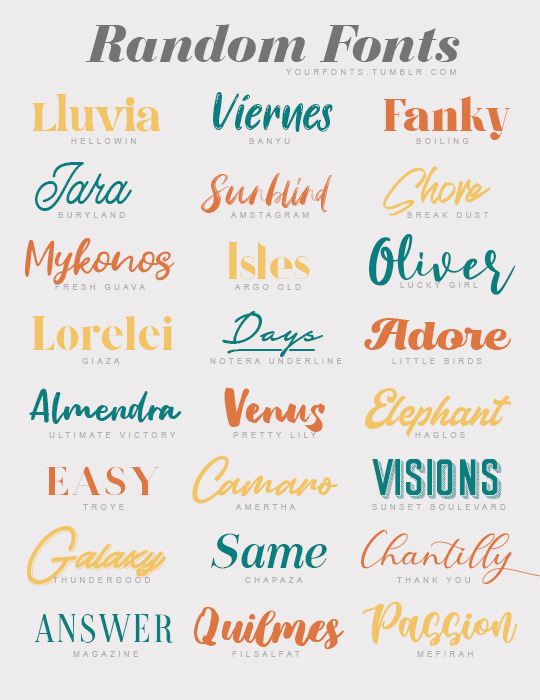
Random fonts
Please like or reblog if you download it
Hellowin - Banyu - Boiling
Buryland - Amstagram - Break dust
Fresh guava - Argo old - Lucky girl
Giaza - Notera underline - Little birds
Ultimate victory - Pretty Lily - Haglos
Troye - Amertha - Sunset Boulevard
Thundergood - Chapaza - Thank you
Magazine - Filsalfat - Mefirah
4K notes
·
View notes
Photo
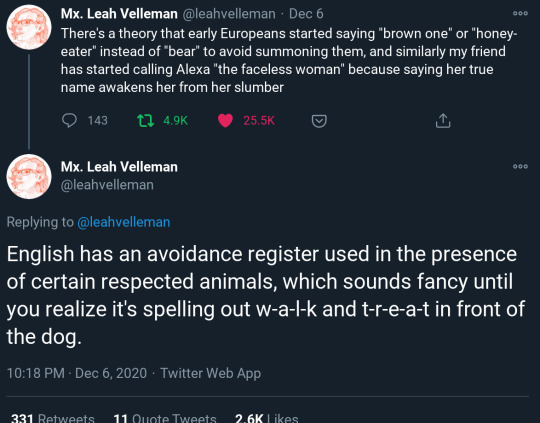
There’s a theory that early Europeans started saying “brown one” or “honey-eater” instead of “bear” to avoid summoning them, and similarly my friend has started calling Alexa “the faceless woman” because saying her true name awakens her from her slumber
English has an avoidance register used in the presence of certain respected animals, which sounds fancy until you realize it’s spelling out w-a-l-k and t-r-e-a-t in front of the dog.
Mx. Leah Velleman on twitter
112K notes
·
View notes
Text
Clothes + verbs in Japanese
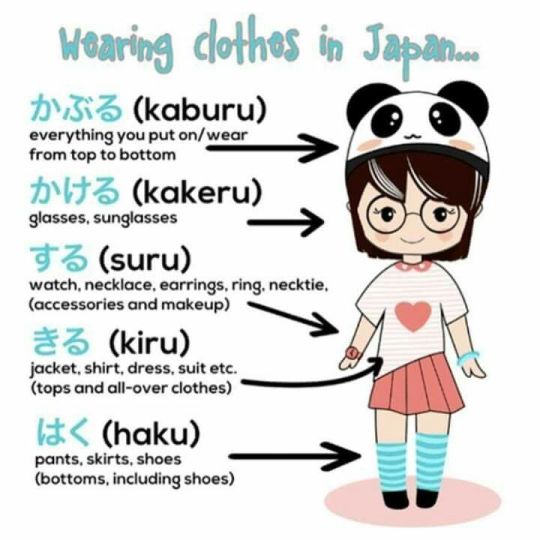
Clothes (ふく) 服
The laundry (せんたくもの) 洗濯物 (as in clothes that need washing)
Verbs related to clothes
To take off (ぬ) 脱ぐ
To do the laundry (せんたく)洗濯 [suru verb]
To hang out the washing (せんたくをほす) 洗濯物を干す
to fold (たた) 畳む
to take in (the laundry) (とりこむ) 取り込む
to do the ironing アイロンを掛ける(kakeru)
Verbs that mean „to wear”
For the items you wear on your head,
かぶる= 被る= kaburu
BUT!
ヘアーアクセサリー ( heaa akusesarii ) hair accessaries. つける / する
イヤホーン ( iyahon) earphone; イヤリング(Iyaringu) earrings つける / する
Items that you wear on top of something,
コート kouto a coat → 着る ( kiru) or はおる ( haoru) to put on or slip on
Lower body
We use はく = haku for the items you wear on your lower body. It has two kanji. 履く& 穿く If the items are for your feet, use 履 and if they are for your lower body — from your waist down — but above your foot, use 穿. Since 穿く is not 常用漢字 ( = jouyoukanjuji )=designated commonly used kanji, you can write in hiranaga.)
Hands and fingers,
指輪 = yubiwa = ring → + はめる / つける / する
手袋 = tebukuro = gloves → はめる or する
More verbs:
めがねをかける。 (Megane o kakeru) I wear glasses.
“かける” to wear shades/ glasses (also means, “to hang.”)
ネクタイを締める。 (Nekutai o shimeru. ) I wear a tie.
“締める” also means, “to tie.”
スカーフを巻く。 (Sukaafu o maku. ) I wear a scarf.
“巻く” also means, “to wrap around.”
時計をする。 (Tokei o suru.) I wear a watch.
Japanese is very specific while English has only one word. I recommend looking up the collocations whenever you are unsure!

Words:
シャツ (shatsu) shirt
Tシャツ (Ti shatsu) T-shirt (there’s alsoピタT)
コート (kouto) a coat
上着 (uwagi) jacket
ジャケット (jaketto) jacket
カーディガン (caadigan) cardigan
ズボン (zubon) a pair of pants
スカート (suka-to) skirt
靴 ( kutsu ) shoes
靴下 ( kutsushita ) socks
ストッキング pantyhose
指輪 (yubiwa ) ring
手袋 (tebukuro ) glove
下着 (shitagi) underwear
香水 (kousui ) perfume
Source: Maggie Sensei
294 notes
·
View notes
Note
do u have any advice for ppl who want to study linguistics and languages but couldnt afford to study it at school?? thanks if you answer this, have a great day
yeah! you can easily download textbooks online and study from them AND I do have a dropbox full of linguistics textbooks!
https://www.dropbox.com/sh/qm7x5dz8fu4bdlp/AADshTfRGZG5JZALkDV6wFlwa?dl=0
it includes phonetics/phonology, sociolinguistics, language acquisition, psycholinguistics, morphology, and etymology.
I also have another dropbox folder full of language textbooks:
https://www.dropbox.com/sh/tdm26h60ccl9pe1/AABg0B3mOGaWLG9Kfyuvut6wa?dl=0
As of October 25: Includes 82 textbooks including Arabic, ASL, Chinese (Mandarin), Croatian, Czech, Danish, Dutch, Estonian, Farsi, French, German, Greek, Hebrew, Hindi, Hungarian, Icelandic, Italian, Japanese, Korean, Lithuanian, Norwegian, Polish, Portuguese, Punjabi, Romanian, Russian, Serbian, Slovene, Spanish, Swahili, Swedish, Tagalog, Thai, Turkish, Urdu, Vietnamese, and Welsh :)
7K notes
·
View notes
